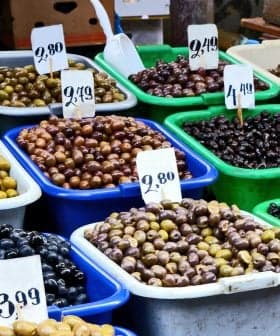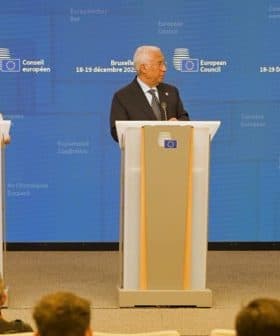Signs of Hope in Palestine's Olive Oil Sector
Free trade deals with Indonesia and the U.K. could provide Palestinian producers with ample export opportunities. The prospects of another poor harvest may complicate this.
 Olive trees in the Garden of Gethsemane
Olive trees in the Garden of GethsemaneIndonesia and the United Kingdom have agreed to import Palestinian olive oil tariff-free, providing hope for an industry facing high production costs and limited export markets. The deals are expected to boost Palestinian olive oil exports to these countries, with Indonesia anticipating a 113 percent increase in imports from Palestine this year. Despite potential challenges from poor harvests, these agreements are seen as beneficial for both the Palestinian economy and the olive oil sector.
Indonesia and the United Kingdom have separately agreed to import Palestinian olive oil tariff-free.
The two deals offer a glimmer of hope for an industry that has been hampered by high production costs, limited export markets and conflict with neighboring Israel.
Given our untapped potential and coupled with a free trade agreement we anticipate to establish solid and sustainable trade relations with the market for olive oil.
The olive oil sector is currently worth about $66.7 million in Palestine, accounting for 4.6 percent of the nation’s GDP, according to a 2018 report from the World Bank.
“Olive oil exports to Indonesia are actually one of the highest potential products for that market following dates exports,” Mohammed Alramah, a market intelligence officer at the Palestinian Trade Center, told Olive Oil Times. “While in the case of the U.K. market, the tools show that we are actually achieving more than our potential share in the market for both olive oil and dates.”
See Also:Olive Oil Export NewsIndonesia’s Central Statistics Agency expects that Indonesia will increase its imports of olive oil and other agricultural goods form Palestine by 113 percent this year.
“The tariff exemption is significant and should be reflected in the products’ pricing in the market,” Djatmiko Bris Witjaksono, director of foreign trade analysis at Indonesia’s Ministry of Trade, told Arab News. “Eventually it will boost the competitiveness of Palestinian products in Indonesia.”
According to Alramah, the new trade deal and the resulting increase of Palestinian olive oil exports will also help to establish Palestinian olive oil brands in foreign markets.
“Given our untapped potential and coupled with a free trade agreement, we anticipate to establish solid and sustainable trade relations with the market for olive oil,” he said.
The Palestinian Trade Center, which helps to develop the nation’s exports, has rated Indonesia as its eleventh highest priority olive oil market. A bit higher up on that list, in at seventh, is the U.K., which has seen considerable growth in olive oil imports from Palestine in the past half-decade.
Between 2012 and 2016, the most recent year for which data is available, the value of olive oil exports from Palestine to the U.K. increased from $286,000 to $1,988,000.
The U.K. had previously eliminated tariffs on imported olive oil from Palestine, but in light of its planned departure from the European Union at the end of this month, has confirmed that it will seek a similar deal once it is outside of the 27-member trading bloc.
The U.K.‘s Foreign Trade secretary, Liam Fox, made the announcement at the end of last month after a tour of the region.
“[This] agreement will help give U.K. and Palestinian businesses, exporters and consumers the certainty they need to continue trading freely as the U.K. prepares to leave the E.U.,” Fox said. “The agreement reflects the importance of the U.K.-Palestinian relationship, a thriving Palestinian economy is in all our interests.”
Palestine currently is unable to competitively export olive oil to many countries in the E.U. due to prohibitive tariffs, which lead Palestinian olive oil to be too expensive and unable to compete for supermarket shelf space.
Antoine Mattar, chair of the Palestine British Business Council, welcomed the move and said it will be helpful for both countries’ economies as well as the Palestinian olive oil sector.
“This agreement avoids unnecessary tariffs which will ultimately save British consumers money on items such as dates and olive oil,” Mattar said. “Frictionless trade also helps to keep people in employment and create new jobs, supporting the Palestinian economy and helping Palestinians work towards a prosperous future.”
Alramah believes that as olive oil consumption continues to grow modestly in the U.K., Palestinian producers will be able to capitalize and remain a competitive exporter to the world’s fifth largest economy.
“If Brexit took effect and there is a new free trade agreement with the U.K., we anticipate our exports to continue to grow in small increments as our olive oil production increases,” he said.
In spite of these free trade deals, Palestinian exports may be hampered in the short-term after a poor harvest at the end of last year and another potential bad harvest looming for next year.
“In 2018, olive oil production was limited because of an infestation,” Alramah said. “Olive trees have been infected by an insect, the olive leaf gall midge, particularly in Tulkarem and Qalqiliya governorates in the northern West Bank.”
“Based on initial estimates, the forthcoming olive harvest may be seriously affected with 80 percent of production at risk,” he added.









